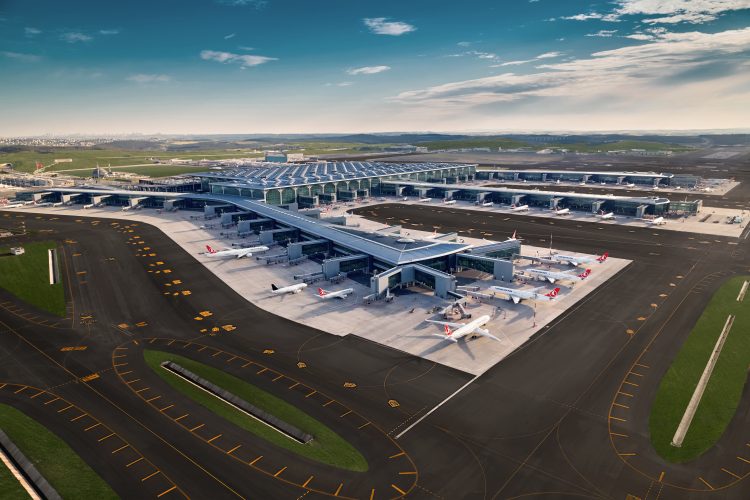iGA Istanbul Airport: pioneering AI and smart technologies for a seamless passenger experience
Posted: 26 May 2025 | | No comments yet
From AI chatbots to RFID baggage tracking, iGA Istanbul Airport pioneers smart aviation solutions. Handling over 80 million passengers annually, its tech-powered operations set new global standards for efficiency and traveller convenience.


Credit: iGA Istanbul Airport
As one of the world’s busiest and most innovative airports, iGA Istanbul Airport is setting new standards in efficiency, safety and passenger convenience through cutting-edge AI, digital technologies and real-time operational coordination. From AI-powered customer service to advanced decision-making at the Airport Operations Centre (APOC), every aspect of airport management is optimised to create a seamless experience for millions of travellers.
By leveraging artificial intelligence, location-based services, and big data analytics, Istanbul Airport is not only streamlining its internal processes but also redefining how passengers interact with airport services.
AI-driven passenger services: enhancing the travel experience
AI plays a crucial role in enhancing the passenger experience, integrating seamlessly into airport operations such as air traffic, ground services and customer interactions. An advanced AI-powered chatbot, available via the mobile app, web, social media, and WhatsApp, provides passengers with instant and personalised assistance. Using Natural Language Processing (NLP), this chatbot helps travellers with flight tracking, location-based navigation, parking payment, vehicle retrieval, premium service purchases and hotel reservations. AI enables the system to understand passenger preferences, provide real-time updates, and offer uninterrupted support, ensuring a stress-free airport experience.
With a relentless focus on efficiency, safety and passenger comfort, iGA Istanbul Airport is not just one of the world’s busiest airports – it is a leader shaping the future of global air travel.”
Beyond AI, Istanbul Airport employs a variety of smart technologies to enhance efficiency and passenger convenience. To improve navigation and accessibility across its massive 1.4 million sqm terminal and 40,000-space parking facility, the airport has developed an advanced mobile application. The app utilises iBeacon technology, a Bluetooth-based positioning system with over 7,000 beacon devices installed throughout the terminal, ensuring five-metre location accuracy across 95% of the airport. This allows passengers, including those with visual impairments, to navigate the terminal with ease, while also receiving personalised recommendations based on their location. Real-time foot traffic monitoring further enables airport management to optimise services, enhancing commercial opportunities for advertising, leasing and premium service offerings.
APOC: the command centre of iGA Istanbul Airport’s operations
At the heart of Istanbul Airport’s operational success is the Airport Operations Centre (APOC), a state-of-the-art command hub that ensures smooth and efficient airport functions. Managing daily operations at this scale requires seamless coordination, and APOC serves as the central nerve centre, bringing together all critical stakeholders, including airlines, ground handling teams, air traffic control, security services and emergency response units. This unified approach allows for real-time collaboration and rapid responses to any operational challenges, whether they stem from weather disruptions, technical issues, or emergency situations. APOC has also played a crucial role in large-scale crisis management efforts, such as earthquake relief operations, ensuring that the airport remains not only operational but exceptionally well-coordinated in times of crisis.
The scale of Istanbul Airport’s operations is immense, with over 1,400 flights handled daily and 355 aircraft stands ensuring optimal aircraft positioning. The airport serves 111 airlines, making it the second most connected airport in the world, ahead of major hubs such as Paris and just behind Bangkok. In 2024, Istanbul Airport ranked as the seventh busiest airport globally, serving over 80 million passengers. On 30 June 2024, the airport achieved a record-breaking daily passenger traffic of 267,882 travellers, further solidifying its position as a global aviation leader.
Advanced technologies driving airport efficiency
Technology is deeply embedded in APOC’s operations, ensuring efficiency and precision in decision-making. One of the most critical systems in place is Airport Collaborative Decision Making (A-CDM), which integrates real-time data from airlines, air traffic control and ground handling teams to optimise flight scheduling and reduce delays. The Flight Information Display System (FIDS) and OPSVIEW provide real-time monitoring of thousands of screens across the airport, ensuring passengers and staff have access to accurate flight updates at all times. AI-powered CCTV and crowd analytics help prevent bottlenecks by analysing passenger density at check-in, security, and immigration points, allowing proactive measures to be taken before congestion becomes an issue.
By leveraging artificial intelligence, location-based services, and big data analytics, iGA Istanbul Airport is not only streamlining its internal processes but also redefining how passengers interact with airport services.”
Baggage handling is another area where technology plays a crucial role. The airport operates a 42km conveyor system, with 28km equipped with an Individual Carrier System (ICS), ensuring that every bag is tracked using RFID technology. This reduces lost baggage incidents and improves delivery times, enhancing passenger satisfaction.
In airside operations, real-time data on taxiway occupancy, gate usage and aircraft turnaround times ensures dynamic adjustments to minimise delays and optimise efficiency.
Real-time data: the backbone of airport operations
Real-time data analytics is the backbone of Istanbul Airport’s operational success, allowing the airport to anticipate and resolve issues before they escalate. Digital density tracking systems enable proactive congestion management by identifying passenger flow patterns and adjusting staffing and queue management accordingly. RFID tracking in baggage operations ensures that every piece of luggage is accounted for, reducing mishandling and improving the overall passenger experience. The ability to dynamically adjust gate assignments and aircraft turnaround procedures based on live data further minimises delays and optimises scheduling.
From AI-driven passenger services to real-time operational coordination at APOC, Istanbul Airport is setting new global benchmarks for efficiency and innovation in aviation. By integrating advanced technologies, collaborative decision-making and real-time analytics, the airport continues to enhance the passenger experience while ensuring operational excellence. As it expands and innovates, Istanbul Airport remains committed to leveraging technology-driven solutions to accommodate growing passenger demand, with a long-term vision of increasing its capacity from 150 million to 200 million passengers.
With a relentless focus on efficiency, safety and passenger comfort, iGA Istanbul Airport is not just one of the world’s busiest airports – it is a leader shaping the future of global air travel.
About iGA Istanbul Airports
iGA was established by the Cengiz-MAPA-Limak-Kolin-Kalyon joint venture group on October 7, 2013 with the aim of introducing a new airport to Istanbul, one of the most developed cities in the world and with a long history. Istanbul Airport was constructed in a record time of 42 months, and is one of the largest infrastructure projects in Türkiye. As of April 2022, iGA’s shareholding structure is as follows: 55% shareholding by Kalyon Holding, and 45% shareholding by Cengiz Holding.
The geographic location of iGA Istanbul Airport has led to its status as an international hub. It serves an estimated 90 million passengers annually, with a main terminal of 1.4 million square meters, three independent runways, an air control tower, and support facilities.
iGA Istanbul Airport, having accommodated over 250 million passengers during the five-year span since its establishment, is now capable of operating flights to 315 destinations around the world as of January 2024. Once all phases are complete, iGA Istanbul Airport will offer flights to more than 300 destinations with an annual passenger capacity of 200 million.
Are you ready to meet the expectations of Gen Z travellers? Join our virtual panel to discover how airports can engage the next generation of passengers.
16 Oct 2025 | 14:00 PM BST | FREE Virtual Panel Discussion
Join us for this interactive session where industry leaders will explore how airports are adapting to the needs and values of Gen Z, the first truly digital-native, socially conscious, and tech-savvy generation.
What You’ll Learn:
- What drives Gen Z travel decisions, and how to respond
- How to harness digital tools, social media, and mobile-first strategies
- How sustainability, inclusivity, and personalised experiences shape Gen Z’s airport expectations
- Real-world examples from leading airports that are successfully engaging younger travellers
Don’t miss your chance to learn from the airports leading this change – Register Now – It’s Free!
Related topics
Airport Collaborative Decision Making (A-CDM), Airside operations, Artificial intelligence (AI), Baggage handling, Big data, Cyber-security, Digital transformation, Innovation, Operational efficiency, Passenger experience and seamless travel, Security
Related airports
Related organisations
Cengiz Holding, Kalyon Holding, Turkish Civil Aviation Authority


















